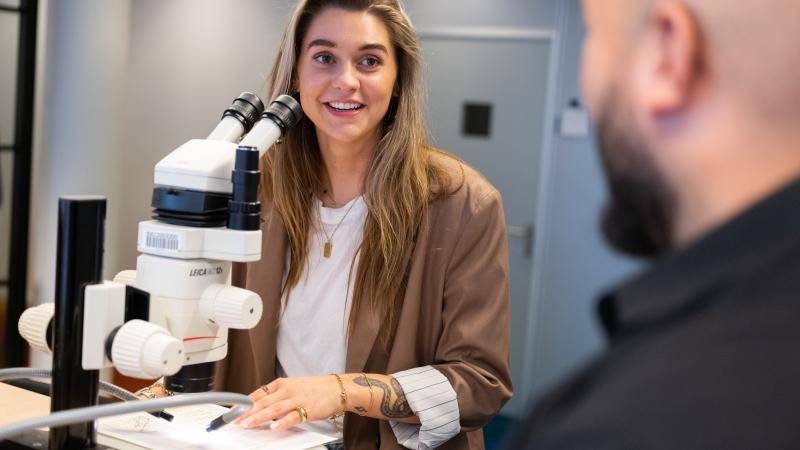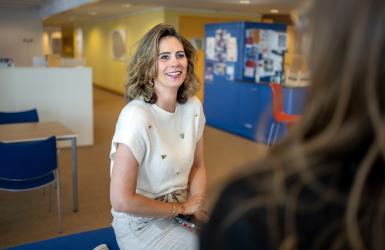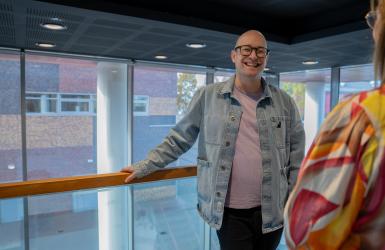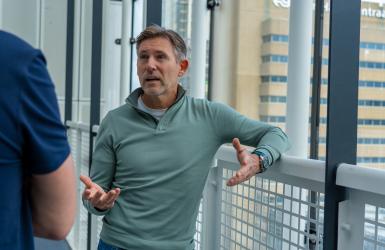The story of Evelien, staff adviser Human Resources (HR)
'Healthy and happy staff' When Evelien joined the IND in 2016, she only planned to spend two years here to gain experience.…

Every time when there is one less false document is a contribution to our national security
Identity and Document Investigation Office of the IND advises government services on the value of source documents. ‘To put it simply, source documents are the underlying documents for travel documents, among other things,’- Liselotte explains. ‘These are, for example, family booklets, marriage certificates or birth certificates. We also deal with other documents used as evidence in an asylum procedure. You can think of court documents, military service certificates or arrest warrants, and many more. In my daily work, I examine these documents. Are they real or are they forged?’
Liselotte has been working at the IND for 4 years now, of which 2 years as a document examiner. ‘First as a junior when I was mainly occupied with administrative tasks; sometimes, I did a final check on documents,’- she says. ‘At that time, I learned many techniques and took various courses through the IND. My goal was to examine documents myself and not just be the last link in the process. This has worked out. I have been working as an examiner for over a year now and I am very happy with it. I am now able to go much deeper into the matter and I can see faster and faster if something is wrong with a document.’ She laughs: ‘I don't always need my magnifying glass for that anymore.’
An investigation into a source document can be very detailed. Liselotte: ‘For example, I compare photos or I check whether a stamp is really stamped and not printed. These are just a few examples. This work requires a lot of attention to detail. Luckily, I have it. That is probably one of the reasons why I ended up in this field.’
Until some years ago, Liselotte played basketball at a high level. ‘After that it seemed a logical step to study sports marketing. That education consisted mainly of commercial economics. Unfortunately, I found out that I had no interest for commercial economics. Really none whatsoever. I much preferred to contribute to the society. I was able to get a job at the IND through an employment agency and I have never considered leaving. In the meantime, I have even entered permanent employment. I had never planned on becoming a document examiner and fighting fraud. In fact, I never even knew this job existed. But I am having such a good time here.’
Less than 10% of the documents examined by the Identity and Document Investigation Office are forged. ‘In percentage terms, this may seem to be not too bad, - Liselotte says. ‘But if you look at how many travel and residence documents are applied for each year and how many investigations we conduct, then we are talking about serious numbers. It feels good that I can contribute to combating this.’>
Liselotte’s job is far from being a quiet one. ‘There has always been a lot to do,’ - she says, ‘but at the moment the workload is really high. We are starting to feel it. At the same time, I am happy that I work at the IND. The colleagues here are not only very skilled, but also extremely helpful. We work together towards one goal and this binds us together. Then I also notice that I have spent a large part of my life on team sports. You have to do it together, I really believe in it. And luckily, the IND believes that too. We work a lot with other national governmental bodies. Municipalities, for example, but also the police and the Royal Netherlands Marechaussee. If they have doubts about the authenticity of a source document, they can have them examined by us. We also find out whether documents have been obtained in a correct way. I like coming to work for that, because every forged document I can stop is another small contribution to our national security.’

'Healthy and happy staff' When Evelien joined the IND in 2016, she only planned to spend two years here to gain experience.…

‘A single conversation can change someone’s day, week, or even their life’ Anyone who contacts the IND with questions about an application, a residence permit, or…

‘I translate wishes into practical solutions’ Marco initially started working at the IND as a self-employed person, but he quickly felt at home…